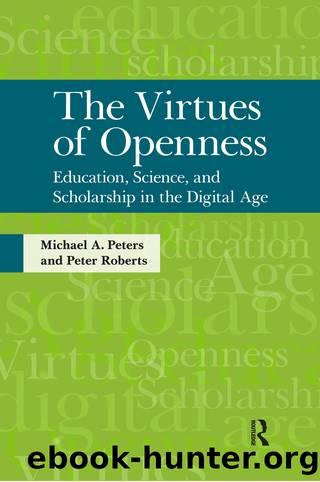Virtues of Openness by Peters Michael A.;Roberts Peter; & Peter Roberts

Author:Peters, Michael A.;Roberts, Peter; & Peter Roberts [Michael A. Peters]
Language: eng
Format: epub
ISBN: 4185996
Publisher: Taylor & Francis Group
Conclusion
We have suggested in this chapter that the movement toward greater openness in scholarly publishing is an incomplete project. We have identified some of the limits to openness, paying particular attention to the politics of knowledge production in contemporary universities. On the whole we applaud initiatives to make well-researched, peer-reviewed scholarly information more readily available to all who might benefit from it across the globe. We are also supportive of the development of openness as an educational virtue. It must be acknowledged, however, that limits to the full flourishing of the open-access movement as well as to other forms of openness will remain over the next few years, though some of these may be reduced in the longer term. We need to recognize that our ability to perceive limits will itself shape the material conditions that govern our intellectual lives. For those working in contemporary universities, performance-based research funding regimes exert an important influence in limiting horizons for greater openness in scholarly publishing. The trend at present is toward a new, narrow form of scientistic thinking, embedded in a limiting language of outputs and impact factors.
This does not mean, of course, that all judgments made under the strictures of performance-based research funding are unjustified or unhelpful. To the contrary, we would defend the need in some circumstances to draw distinctions between different researchers, journals, and institutions. Maintaining rigor is vital, and this is consistent with many of the other attributes that constitute scholarly openness. Cyberspace has, in some senses, made the world a more âopenâ place, but it has also allowed for the proliferation of a great deal of information that is trivial, misleading, defamatory, inadequately researched, and poorly argued. Openness should have some limits, especially in the scholarly world.
Openness will always be bounded (Braman 2006), and indeed some limits are necessary to allow openness. One person's unfettered openness can constitute an impediment to others seeking the same goal. Moreover, we cannot assume that all participants in an optimally open system will act in good faith; this is why there remains a need for some editorial oversight even with an initiative such as Wikipedia (May 2010). At the level of the individual scholar, limits to openness are necessary to maintain intellectual coherence and focus. The key is to establish a robust platform for debating how such limits might be determined while also recognizing that the forms of closure that govern our academic lives may impede our very ability to perceive alternatives.
Download
This site does not store any files on its server. We only index and link to content provided by other sites. Please contact the content providers to delete copyright contents if any and email us, we'll remove relevant links or contents immediately.
The Art of Coaching Workbook by Elena Aguilar(51158)
Trainspotting by Irvine Welsh(21636)
Twilight of the Idols With the Antichrist and Ecce Homo by Friedrich Nietzsche(18618)
Fangirl by Rainbow Rowell(9228)
Periodization Training for Sports by Tudor Bompa(8250)
Change Your Questions, Change Your Life by Marilee Adams(7754)
This Is How You Lose Her by Junot Diaz(6873)
Asking the Right Questions: A Guide to Critical Thinking by M. Neil Browne & Stuart M. Keeley(5755)
Grit by Angela Duckworth(5601)
Red Sparrow by Jason Matthews(5463)
Paper Towns by Green John(5175)
Room 212 by Kate Stewart(5102)
Ken Follett - World without end by Ken Follett(4720)
Housekeeping by Marilynne Robinson(4434)
The Sports Rules Book by Human Kinetics(4378)
Double Down (Diary of a Wimpy Kid Book 11) by Jeff Kinney(4257)
Papillon (English) by Henri Charrière(4256)
The Motorcycle Diaries by Ernesto Che Guevara(4088)
Exercise Technique Manual for Resistance Training by National Strength & Conditioning Association(4058)
